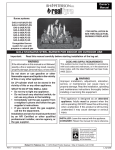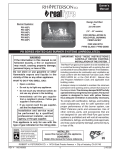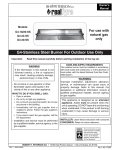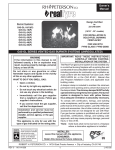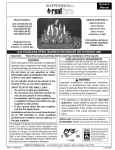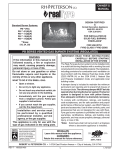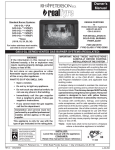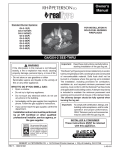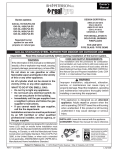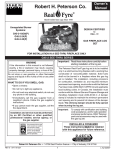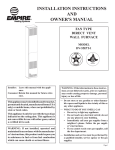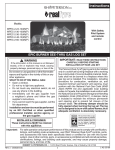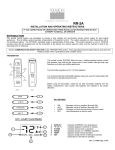Download R.H. Peterson G45-2 SEE-THRU Series Owner`s manual
Transcript
Owner’s Manual Design Certified to: Z21.84b-2004 Burner Systems: G45-2-GL-16/19(P) G45-2-GL-18(P) G45-2-GL-24(P) G45-2-GL-30(P) G45-2-GL-36(P) G45-2-GL-42(P) G45-2-GL-48(P) G45-2-GL-60(P) (16/19" - 30" models) FOR INSTALLATION IN SOLID-FUEL BURNING FIREPLACES* FOR USE WITH GLASS/GEMS G45-2-GL SERIES VENTED GAS BURNER SYSTEMS (UNREGULATED) IMPORTANT: READ THESE INSTRUCTIONS CAREFULLY BEFORE STARTING INSTALLATION OF THE SYSTEM. WARNING If the information in this manual is not followed exactly, a fire or explosion may result, causing property damage, personal injury, or loss of life. The Real-Fyre gas burner system is to be installed only in a solid-fuel burning fireplace with a working flue and constructed of noncombustible material.The installation, including provisions for combustion and ventilation air must conform with the National Fuel Gas Code, ANSI Z223.1/NFPA 54, or the CSA B149.1, Natural Gas and Propane Installation Code, and applicable local building codes. A damper clamp is included to maintain the minimum permanent vent opening and to prevent full closure of the damper blade. The chimney damper MUST be fully opened when burning the burner system.The burner system is designed to burn with yellow flames; thus adequate ventilation is absolutely necessary. To comply with certification, listings, and building code acceptances, and for safe operation and proper performance of this burner system, use ONLY Peterson parts and accessories. Use of other controls, parts, and accessories that are not designed for use with RealFyre gas burner systems is prohibited and will void all warranties, certifications, listings, and building code approvals, and may cause property damage, personal injury, or loss of life. *Note: Solid-fuels shall not be burned in a fireplace where a decorative appliance is installed. Do not store or use gasoline or other flammable vapors and liquids in the vicinity of this or any other appliance. WHAT TO DO IF YOU SMELL GAS: • Open a window. • Do not try to light any appliance. • Do not touch any electrical switch; do not use any phone in the building. • Immediately call the gas supplier from a neighbor’s phone. Follow gas supplier’s instructions. • If you cannot reach the gas supplier, call the fire department. Installation and service must be performed by a qualified professional installer, service agency, or the gas supplier. This appliance is only for use with the type of gas indicated on the rating plate. INSTALLER: Leave this manual with the appliance. CONSUMER: Retain this manual for future reference. Robert H. Peterson Co. • 14724 East Proctor Avenue • City of Industry, CA 91746 REV 1 - 1009220843 1 L-A2-265 TABLE OF CONTENTS GENERAL INFORMATION PARTS LIST IMPORTANT PRE-INSTALLATION AND FIREPLACE SAFETY INFORMATION GLASS/GEMS QUANTITY DETERMINATION INSTALLATION INSTALLING THE BURNER GLASS/GEMS PLACEMENT BURNER PREPARATION OPERATING INSTRUCTIONS CLEANING AND MAINTENANCE MAINTENANCE CLEANING SERVICE FLAME DESCRIPTION PILOT BURNER ADJUSTMENT (IF EQUIPPED) TROUBLESHOOTING WARRANTY 2 3 4 5 6 6 8 8 9 10 10 10 10 10 11 12 14 GENERAL INFORMATION Keep the area of the gas burner system clear and free from combustible materials, gasoline, and other flammable vapors and liquids. Burner size Min. Fireplace Dimensions BTU Width* Depth Height NAT. L.P. 16/19" 25" 12" 18" 45k 35k 18" 26" 12" 18" 65k 60k 24" 30" 12" 18" 75k 65k 30" 36" 12" 18" 80k 70k [36"] 42" 12" 18" 120k 110k [42"] 48" 12" 18" 130k 120k [48"] 54" 12" 18" 150k 130k [60"] 66" 12" 18" 170k 140k * This required width allows for centering of the system. Add 4" to front width if the burner is to be installed with a pilot kit. Note: Bracketed sizes indicate non-certified burner systems. Minimum Free Opening Area of Chimney Damper for Venting (sq. in.) For Factory-Built Fireplaces * Chimney Height 15' (min.) 20' 30' 16/19" 18" 24" 30" 36" 42" 48" 60" 28 26 23 41 37 33 47 42 38 50 45 40 75 68 61 82 73 66 94 85 76 107 96 86 * For Masonry-Built Fireplaces; add 4 sq. in. to amount shown. REV 1 - 1009220843 2 L-A2-265 GENERAL INFORMATION (Cont.) The Real-Fyre® gas burner system is to be installed only in a fully vented, noncombustible fireplace with an open damper. The chimney must be free of any obstructions. The fireplace must be designed and approved to burn wood. Testing the Gas-Supply System: The gas burner system and its individual shutoff valve must be disconnected from the gas-supply piping system while performing any tests of the piping system at pressures in excess of 1/2 psig. The gas burner system must be isolated from the gas-supply piping system by closing its individual manual shutoff valve during any pressure testing of the gas-supply piping system at test pressures equal to or less than 1/2 psig. The fireplace must have a gas-supply line that has been installed by a qualified technician in accordance with all local codes. The gas-supply line must be 1/2" minimum interior diameter. If the gas line to the fireplace is longer than 20', a larger-diameter line may be necessary. A fireplace screen must be in place when the system is burning. Provisions for adequate combustion air must be maintained. Unless other provisions for combustion air are provided, the screen shall have an opening(s) for introduction of combustion air. Combustion air is adequate when all flames curl into the fireplace and away from the screen. When a glass fireplace enclosure (door) is used, leave the doors fully open when the system is in operation. Be sure to clean the fireplace floor of any ashes or other foreign materials. It is recommended that the fireplace and chimney be inspected by a chimney sweep or other qualified person before you install the Real-Fyre® gas burner system. Required Gas Pressure: The minimum inlet gassupply pressure for the purpose of input adjustment is 7" water column (w.c.) for natural gas and 11" w.c. for propane gas. The maximum inlet gas-supply pressure is 10.5" w.c. for natural gas and 13" w.c. for propane gas. PARTS LIST Before installation, check that your gas burner system is complete. See the PARTS LIST below. If any parts are missing or damaged, contact your Real-Fyre® dealer before installing or using the burner. Be sure you know the model and size of your set when ordering options or replacement parts and accessories. ITEM No. DESCRIPTION 1. Burner pan Fuel injector (nat. only) / air mixer 2. (propane only) 1 3. 4. 5. 2 6. QTY 1 Damper clamp with bolt Connector kit (with adapters) Separation grating Select sand granules (nat. only) or vermiculite granules (propane only) 1 1 1 1 1 Glass/gems packaged separately. Quantity will vary, depending on selection. Glass and gems are available in various colors; contact your dealer for further details. 5 6 Replacement parts are available through your local Real-Fyre® dealership. 4A 4B 4C (PHOTOS NOT TO SCALE) 3 REV 1 - 1009220843 3 L-A2-265 IMPORTANT PRE-INSTALLATION AND FIREPLACE SAFETY INFORMATION CAUTION: Installation and repair must be done by an NFI Certified or other qualified professional installer. Installer: Carefully read these instructions before installing this gas burner system. Be sure you understand all safety precautions and warnings contained in this manual. A. This appliance is designed as an attended appliance. Adults must be present when this gas appliance is operating. Do not leave this unit burning when unattended or while anyone is sleeping. B. This appliance is only for use with the type of gas indicated on the rating plate. This appliance is NOT FIELD CONVERTIBLE for use with other gasses. C. BE CAREFUL: If not installed, serviced, and used correctly per these instructions, this product can cause serious personal injury, property damage, or loss of life. D. WARNING: Before installing in a solid-fuel-burning fireplace, the chimney flue, damper, and firebox must be thoroughly CLEANED of soot, creosote, ashes, and loose paint, and must be inspected by a qualified chimney cleaner. Some older fireplaces may need repair prior to installing this appliance. E. CHECK GAS TYPE (natural or propane): The gas supply must be the same as stated on your burner system rating plate. If gas supply is different, DO NOT INSTALL. Contact your dealer for immediate assistance. F. Keep the area of the gas burner system clear and free from combustible materials, gasoline, and other flammable vapors and liquids. G. INSUFFICIENT GAS PRESSURE WILL KEEP THE PILOT (IF EQUIPPED) FROM OPERATING PROPERLY. DO NOT USE IF GAS PRESSURE IS LOWER THAN THE MINIMUM REQUIREMENT. 7" water column (w.c.) on natural gas H. The minimum inlet gas-supply pressure for purposes of input adjustment is 5" and 11" w.c. on propane gas. Insufficient gas pressure will affect proper operation of the pilot (if equipped). Do not install this gas appliance if minimum pressure is not available. The maximum inlet gas-supply pressure is 10.5" w.c. on natural gas and 13" w.c. on propane gas. The propane source must be regulated. (Do not connect this appliance directly to an unregulated propane gas tank - this can cause an explosion.) I. The gas piping system must be sized to provide minimum inlet pressure at the maximum flow rate (BTU/hr). Undue pressure loss will occur if the pipe is too small, or the run is too long. Gas supply pipe must be 1/2" minimum interior diameter. If the gas line is longer than 20', a larger diameter line may be necessary. J. Input ratings shown in BTU per hour are for elevations up to 2,000 ft. For elevations above 2,000 ft., refer to the National Fuel Gas Code or contact manufacturer before installing this product. K. This gas appliance and its main gas valve must be disconnected from the gas-supply piping system during any pressure testing of that system at test pressures in excess of 1/2 psig. L. This gas appliance must be isolated from the gas-supply piping system by closing the equipment shutoff valve connected to the gas-supply line during any pressure testing of the gas-supply piping system at test pressures equal to or less than 1/2 psig. M. Do not use this appliance if any part has been underwater. Immediately call a qualified service technician to inspect the appliance and to replace any part of the control system and any gas control that has been underwater. N. A fireplace screen must be in place when the system is burning. Provisions for adequate combustion air must be maintained. Unless other provisions for combustion air are provided, the screen shall have an opening(s) for introduction of combustion air. Combustion air is adequate when all flames curl into the fireplace and away from the screen. When a glass fireplace enclosure (door) is used, leave the doors fully open when the system is in operation. O. This appliance may be installed in an aftermarket, permanently located, manufactured (mobile) home, where not prohibited by local codes. Installation of appliances designed for manufactured home (U.S. only) or mobile home installation must conform with the Standard CAN/CSA Z240 MH, Mobile Housing, in Canada, or with the Manufactured Home Construction and Safety Standard, Title 24 CFR, Part 3280, in the United States, or when such a standard is not applicable, ANSI/ NCSBCS A225.1/NFPA 501A, Manufactured Home Installations Standard. 4 GLASS/GEMS QUANTITY DETERMINATION CAUTION: Sand granules are for use with natural gas systems only. Always use vermiculite granules for propane gas systems. The granules that come with the burner system are pre-measured and must be used per these instructions (see GLASS/GEMS PLACEMENT section). Decorative glass/gems (purchased separately) must be placed to cover the burner (but not on the valve or pilot, if equipped). See Table 5-1 for the minimum bag requirement depending on your burner size. Additional glass/gems may be purchased and placed around the burner if desired. Should you wish to fill the entire fireplace floor with glass/gems; instead use Table 5-2 to determine how many bags of glass/gems to order based on fireplace size. One 10-lb. bag of glass/gems fills approximately 144 cubic inches. CAUTION: When covering the burner with glass/gems; do not exceed 1" above the top of the burner. Additional glass/gems directly on top of the burner may result in unsafe ignition. Minimum burner coverage requirement Table 5-1 Glass/gems 10 lb. bag(s) needed Burner size 16/19 18 24 30 36 42 48 60 1 2 2 2 4 4 4 5 - OR Fireplace complete coverage Table 5-2 Fireplace Opening size 28" 36" Standard Fireplace Sizes 32" see-thru 42" 50" Center width (in.) Front to back depth (in.) Area (sq. in.) Glass/gems 10 lb. bags needed for 2" depth 25 16 400 6 540 8 30 23 690 10 31 23 713 10 36 30 828 12 1085 15 1334 19 46 33 These bag quantities listed allow for an approximate 2" depth of glass in the entire fireplace floor, without a burner. (The volume of the burner will take up some space, allowing for some excess glass to be used as desired, or stored as extra for later use.) Your fireplace area can be determined by measuring the center width of your fireplace in inches and multiplying by the depth from front to back in inches. You can then use the area column in the table above to approximate the number of bags needed. Height Width Depth 5 INSTALLATION The damper clamp with hex bolt (Fig. 6-1) is provided as a means to prevent full closure of the damper blade. The clamp is easily attached to most damper blades with pliers or a wrench, and must be permanently installed. The clamp is designed to prevent accidental closure of the damper when installed as illustrated (Fig. 6-2 and Fig. 6-3). Should the clamp not fit, or fail to provide the permanent vent opening listed in the table found above, have a permanent stop installed, remove the damper blade, or have the damper cut to provide the minimum permanent opening Set screw required. Note: T h e s e a r e m i n i mu m d a m p e r o p e n i n g specifications. The damper must be completely opened when operating this gas appliance to achieve the best ventilation possible. Damper clamp Fig. 6-1 Open Closed Fig. 6-2 Fig. 6-3 INSTALLING THE BURNER The Real-Fyre gas burner system must be installed by a qualified professional service technician. Instructions must be followed carefully to ensure proper performance and full benefit from the gas burner system. Check to be sure the burner system is designed and labeled for the type of gas (natural or propane gas) supplied to the fireplace. Fireplace floor must be level, clean, and smooth. WARNING: Failure to position the parts in accordance with these diagrams or failure to use only parts specifically approved with this appliance may result in property damage or personal injury. REFER TO THE PARTS LIST WHEN FOLLOWING THESE INSTRUCTIONS. If your burner is to be installed with a pilot kit; carefully follow the instructions supplied with your pilot kit for specific gas connection. The burner pan is supplied with an air mixer for propane gas or a fuel injector for natural gas. The air mixer / fuel injector must be used in ALL installations. The air mixer / fuel injector has a precisely sized orifice to ensure only the proper quantity of gas enters the burner. This allows maximum performance and gas conservation. 1. MAKE SURE THE FIREPLACE GAS SUPPLY IS TURNED OFF. 2. Locate the gas-supply stub inside the fireplace and remove the cap, if attached (see Fig. 6-4). CAUTION: When removing the cap, make sure the stub does not turn, loosening the connection inside the wall. 3. Attach the small adapter (Item 4C) to the fuel injector / air mixer on the burner pan, using a pipe compound resistant to all gases. Tighten securely. DO NOT REMOVE THE FUEL INJECTOR / AIR MIXER. Then attach one end of the flex connector (Item 4B) to the small adapter. Tighten securely. 4. Place the burner system into the fireplace so that it is centered centered.and the open burner pan faces outward. Fig. 6-4 Gas line cap Gas supply line stub 6 INSTALLATION (cont.) 5. Be sure gas to the fireplace is off. Attach the large adapter (Item 4A) to the gas-supply stub using a pipe compound resistant to all gases. Tighten securely. Then attach the open end of the flex connector to the large adapter. Tighten securely. Ensure the pan rests level on the fireplace floor after connection. Adjust the pan if necessary. 6. LEAK TEST: Use a long-necked butane lighter, or lay a lighted match next to the burner pipe, and carefully turn on the gas supply until the burner ignites. Test at all connections for leaks using the appropriate soapy water solution. If bubbles appear, a leak is present. Turn off the gas and tighten at all connections. Repeat until no leaks are present. If a leak persists, turn off the gas supply and contact the local gas company or dealer. NEVER USE A FLAME TO CHECK FOR LEAKS. Turn off the gas supply prior to proceeding. 7 Fig. 7-1 - Fireplace valve Fuel injector / air mixer Burner pan Flex connector Large Adapter Small adapter Gas supply stub GLASS/GEMS PLACEMENT BURNER PREPARATION Burner pan Granules up to burner tube After hooking up the burner to the fireplace gas supply and placing the heat shield on the valve assembly (if applicable), the decorative media (granules and glass/gems) must be added for the burner to function as designed. Note: Installation is the same for glass and gems. Glass shown here. These instructions show sand granules being used as a base for the glass, but only natural-gas burners use sand. For propane burners, follow these instructions using vermiculite. Fig. 8-1 Separation grating WARNING The burner and pilot (if equipped) must be OFF (fully extinguished), and all valve covers must be in place before pouring media onto the burner. It may also be necessary to temporarily cover the pilot assembly (if equipped) to keep media out of it during this procedure. GRANULE PLACEMENT Fig. 8-2 1. Partially fill the burner pan with the granules*, up to the burner tube (see Fig. 8-1). *Note: Use only select sand for natural gas burners and vermiculite for propane gas burners. 2. Place the separation grating over the granules so that the angled parts hook over and back of the part hooks overthe thefront top and burner pan, as shown in Fig. 8-2. Granules sloped to burner pan Note: The grating must correctly rest onto the burner pan. If it sits too high; remove some of the granules to ensure a proper fit. Fig. 8-3 3. Pour the remainder of the granules onto the separation grating, filling the pan. Avoid spilling the granules on the pilot kit (if equipped). Slope the granules at the same angle as the burner pan. This is important to ensure quiet lighting and even flame distribution (Fig. 8-3). GLASS/GEMS PLACEMENT CAUTION: Glass pieces may have sharp edges. Be careful handling the glass. Use hand protection, such as gloves, if necessary. Fig. 8-4 1. Pour the glass/gems directly on top of the granules so that the burner pan is covered completely and evenly. Do not exceed a 1" depth directly above the burner. 2. AddAt additional around theas burner pan as Note: this stageglass/gems the burner will function designed; desired (Fig. 8-4). however, more glass/gems may be added around the burner for decorative purposes. If glass/gems are desired behind the burner pan, they may be left at a lower level than the back of the pan, as shown in Fig. 8-5, or raised up to or above the level in the back of the pan. 2. Add additional glass/gems around the burner pan as desired (Fig. 8-5). 8 OPERATING INSTRUCTIONS Before operating your gas log set: 1. Be sure your fireplace is free from flammable liquids or combustible materials. 2. Be sure your damper is open. 3. Smell all around the gas log set for the odor of escaping gas. IF YOU SMELL GAS, FOLLOW THE INSTRUCTIONS ON P. 1. If your gas log set is operated by the fireplace valve: 1. Lay a lighted long-stem match on the surface of the embers near the gas inlet (do not hold the match in your hand) or use a lighted long-necked butane lighter (Fig. 9-1). 2. Slowly turn the fireplace remote valve to the ON position. Your log set should light. 3. If the log set does not light before the match goes out, immediately turn the valve to the OFF position. 4. Wait approximately five (5) minutes to clear out any gas, and repeat steps 1-3 above. 5. If your log set fails to light again, turn the valve to the OFF position and contact your dealer or gas supplier. 6. To extinguish your gas log set, turn the valve to the OFF position. Be sure the valve is turned fully off to avoid any gas leakage. Fig. 9-1 Apply match - then turn on gas If your burner is operated by a pilot kit: 1. Carefully follow the lighting instructions supplied with your pilot kit for the steps to ignite the burner. 9 CLEANING AND MAINTENANCE MAINTENANCE SERVICE Once installed and operating properly, your RealFyre® glass burner will require regular maintenance. You should inspect your glass burner and controls (where installed) for the following: While some minor service conditions can be handled by the owner of the glass burner, a qualified professional service technician should be called to maintain and service your glass burner and any installed control systems. In addition, a periodic examination and cleaning of the solid-fuel-burning fireplace venting system should be conducted by a qualified professional service technician. The TROUBLESHOOTING section of these instructions serves as a guide for ensuring optimum performance of your glass burner. 1. Moisture may cause the glass in your burner pan to settle. To improve the burn, follow these tips: a. Settling of glass - Using a screwdriver or flat-blade knife, carefully stir the glass, loosening the material. Clear up any spills. 2. Debris around the control (if equipped) -Inspect control and pilot to be sure they are free of dirt or debris. To protect your investment in your Real-Fyre® gas fireplace burner system and keep it operating safely for years to come, maintain, clean, and inspect it regularly. We recommend following these instructions at the beginning of each fireplace season and as needed throughout the year, depending on your usage pattern and the environmental conditions in your home. More frequent cleaning and maintenance may be necessary when burning propane gas than with natural gas. 3. Insects and burner blockage - Check the burner ports and air shutter, if present, to make sure they are free from debris. Blocked burner ports and orifices may result in a fire at the air shutter. CLEANING The pilot assembly (if equipped) must be kept clean and clear of debris at all times for the fireplace burner system to be safely and effectively operated. Dust, carpet fibers, paper, spider webs, pet hair, etc. in the fireplace or on the burner assembly can affect operation of burner and pilot assembly. Vacuum or use compressed air from a can or compressor to clean out pilot assembly area, air shutter holes, burner orifices, and pilot air intake openings. Blockage in this area will affect the operation of pilot assembly. • Replace all batteries for remote transmitters and receivers if installed. • Check and readjust the burner air shutter. • Clean and test the ignitor and pilot (if equipped). FLAME DESCRIPTION Observe the flames. The flames should be blue at the base and a combination of blue/yellow at the body and tips. The flames should be 16" to 18" tall. (See Figure 10-1). Inspect the flames periodically. If flames appear different, contact a professional service technician or your gas supplier to correct the problem. Fig. 10-1 10 PILOT BURNER ADJUSTMENT (IF EQUIPPED) The pilot burner is preset at the factory and should normally not require any adjustment. However, should adjustment be necessary, the following steps should be taken: With the pilot burner lit and the control knob in the pilot position, remove the heatshield covers. Adjust the screw located on the control valve (see Fig. 11-1). Using a screwdriver, turn the pilot adjustment screw slowly clockwise to reduce the flame, or counterclockwise to increase the flame. PilotPILOT adjustment The adjustment screw can be turned so that the pilot flame is completely extinguished. The pilot flame should be a quiet soft blue flame with yellow tipping that encircles the thermocouple tip. Replace the heatshield covers. Turn the control knob to the ON position to assure proper ignition of the burner system. Fig. 11-1 ADJUSTMENT Example of burner pilot flame with thermocouple 11 Example of burner pilot flame with thermopile TROUBLESHOOTING SYMPTOM 1. Smoking and/or sooting CAUSE A. Poor draft or downdraft A. Check for chimney blockage. Be sure chimney is at least 3' taller than anything within 10' of it in all directions. If not, consult a chimney sweep. Chimney cap or fan may help. Under severe conditions, you may need to open a window near the fireplace about 1" to 2" when burning the unit. B. Improper burner for gas used B. Use only a natural-gas set with natural gas or use only a propane-gas set with propane gas. C. Damper closed C. Open damper fully when operating burner system. D. Burner is positioned too close to the front of the firebox D. Move burner system to the center of the firebox. E. Improper glass/gems placement or amount E. See PLACEMENT OF GLASS/ GEMS section. F. Flue is less than 8" in diameter F. I n a d e q u a t e f i r e p l a c e ventilation; consult with a fireplace expert. G. Air mixer on propane set is closed G. Open air mixer completely. A. Incorrect decorative media for type of gas used A. Consult your dealer for proper set. B. Insufficient gas supply B. Other gas appliances may be competing for gas supply. Consult installer or plumber. Orifice size is based upon 7" w.c. pressure for natural gas and 11" w.c. pressure for propane gas. Plumbing must supply adequate pressure. C. Blockage or kink in connector kit, plumbing, or burner orifice C. Clean out blockage. If connector kit is kinked, replace it. D. Valve not fully open D. Open valve fully. ( I M M E D I AT E LY STOP USING. Call your gas supplier or another qualified professional installer or service agency.) 2. Low flame SOLUTION 12 TROUBLESHOOTING (cont.) SYMPTOM 3. Uneven flame distribution (Lower at one end of the burner) 4. Flame at air mixer (For propane units) CAUSE SOLUTION A. Clogged or blocked portholes A. Burner ports can be cleared of foreign objects by running a wire through them. B. Insufficient gas pressure and/or supply B. Consult installer or plumber (see solution 2B). C. Decorative media may be packed down too tightly C. Loosen media around burner pipe by running a kitchen knife along both sides of the pipe. Even out media in burner pan. D. Auxiliary shutoff valve partially closed D. Open valve fully. Usually you will find this along the wall 3' from the fireplace. A. Clogged or blocked burner ports A. Burner ports can be cleared of foreign objects by running a wire through them. B. Insufficient gas pressure and/or supply B. Consult installer or plumber (see solution 2b). C. Decorative media may be packed down too tightly C. Loosen media around the burner by running a kitchen knife along both sides of the pipe. Be sure granules are used with an air mixer. D. Excessive gas pressure D. Contact your gas supplier. 13 WARRANTY PETERSON VENTED DECORATIVE GAS APPLIANCE LIMITED WARRANTY All Peterson burner assemblies are WARRANTED for TEN (10) YEARS. All Peterson glass is WARRANTED for TEN (10) YEARS. SPK-26 controls are covered by a THREE (3) YEAR “All Parts” Warranty. All other Peterson valves, pilots, and controls are covered by a ONE (1) YEAR Limited Warranty (excluding batteries). PLEASE KEEP A COPY OF YOUR SALES SLIP FOR PROOF OF PURCHASE This warranty applies to the original purchaser and to single family residential use only. It commences from date of purchase, and is valid only with proof of purchase. This warranty does not cover parts becoming defective through misuse, accidental damage, electrical damage, improper handling, storage, and/or installation. Product must be installed (and gas must be connected) as specified in the instructions or operator’s manual, by a qualified professional installer. Accessories, parts, valves, remotes, etc., when used must be Peterson Co. product. This warranty does not apply to rust, corrosion, oxidation, or discoloration, unless the affected component becomes inoperable. It does not cover labor or labor-related charges. This warranty specifically excludes liability for indirect, incidental, or consequential damages. Some states do not allow the exclusion or limitation of incidental or consequential damages, so the above exclusion may not apply to you. This warranty gives you specified legal rights, and you may have other rights that may vary from state to state. For additional information regarding this warranty, or to place a warranty claim, contact the R.H. Peterson dealer where the product was purchased. TO REGISTER YOUR PRODUCT ONLINE GO TO: WWW.RHPETERSON.COM, AND CLICK ON PRODUCT REGISTRATION. THANK YOU FOR YOUR PURCHASE. Robert H. Peterson Co. • 14724 East Proctor Avenue • City of Industry, CA 91746 14














